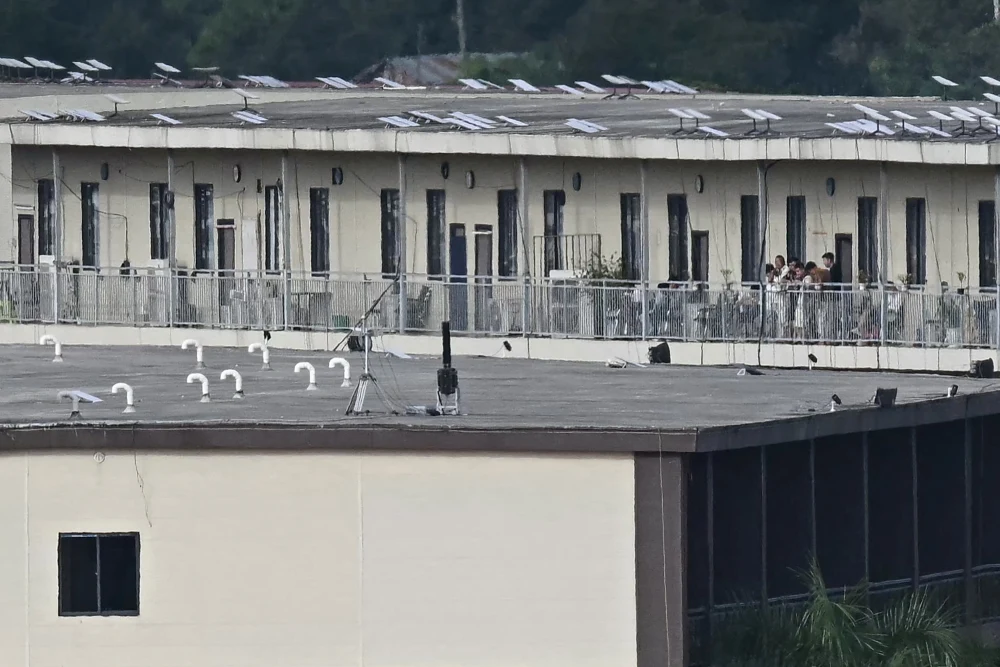
SpaceX says it has disabled more than 2,500 Starlink devices used at scam compounds in Myanmar after activists warned the network was aiding global fraud.
Myanmar’s military recently raided and shut down a major cybercrime hub along the Thai border, seizing dozens of Starlink terminals used by scam syndicates. In response, Elon Musk’s SpaceX says it has now disabled more than 2,500 Starlink devices operating in and around scam compounds in Myanmar after activists warned that mostly Chinese-run criminal networks were exploiting the service to defraud victims worldwide.
SpaceX “proactively identified and disabled over 2,500 Starlink kits in the vicinity of suspected scam centers,” Lauren Dreyer, the company’s vice president of business operations, announced on X late Tuesday. She said Starlink remains committed to being “a force for good” by connecting underserved areas while also detecting and shutting down misuse by bad actors.
Starlink terminals provide high-speed internet in remote locations using satellite dishes that link to SpaceX’s low-Earth-orbit constellation. Images had previously shown the dishes mounted on the roofs of known scam compounds along the Thai-Myanmar border.
The SpaceX announcement followed a crackdown by the Myanmar army on a notorious online fraud center known as KK Park. According to state media outlet Myanma Alinn, troops seized 30 Starlink terminals and detained nearly 2,200 people in a raid Monday near Myawaddy, a major trade town in Kayin State.
Myanmar has become a global hotspot for cybercrime since the 2021 coup toppled the civilian government. The country is now fractured by civil war between the junta and multiple ethnic armed groups, producing a lawless environment in which scam syndicates flourish.
Many workers inside these compounds are trafficking victims from other countries, lured with false job offers and then forced to run online romance and investment scams. Under pressure from Thailand and China — whose citizens are also trafficked into such centers — the junta, in rare coordination with its armed rivals, launched a large raid in February and released hundreds of coerced workers.
Similar scam operations are widespread in neighboring countries such as Cambodia, where U.S. authorities recently seized more than $14 billion in bitcoin and charged a conglomerate chairman in a massive cryptocurrency scheme. The U.S. and U.K. have since sanctioned the firm, labeling it a transnational criminal organization.
According to the U.S. Treasury Department, Americans lost at least $10 billion to Southeast Asia-based scams last year — a 66% increase from 2022.
Analysts say the SpaceX shutdown is a rare instance of a major tech company intervening directly in a criminal ecosystem that sits beyond national law enforcement reach. Unlike traditional internet backbones, Starlink operates without dependence on local telecom infrastructure, making it attractive to armed groups, illicit casinos and scam syndicates across conflict zones.
Cyber-fraud centers in Myanmar are especially difficult to dismantle because they are protected — and in some cases run — by militias, rebel armies, or military-linked business networks. These groups tax or profit from the scams while providing armed security, making police raids risky and inconsistent.
Regional governments have grown increasingly vocal as the scams hit their own citizens. China has demanded the extradition of Chinese suspects running online fraud rings in Myanmar and Cambodia, while Thailand has set up special repatriation units at the border to rescue trafficked victims returning from scam compounds.
International watchdogs warn that the crackdown, while significant, is unlikely to end the practice. Syndicates routinely relocate across borders, rebrand under new entities, or move operations to countries with weaker enforcement such as Laos and the Philippines.
Forensic analysts say the seizure of Starlink hardware will not cripple the business model unless the financial flows are disrupted. Most scams rely on cryptocurrency rails, shell companies and cross-jurisdictional banking layers that make recovery and attribution extremely difficult.
Meanwhile, the humanitarian dimension persists. Rights groups say thousands of trafficked workers remain trapped in compounds in Myanmar and Cambodia, under threat of beatings, electric torture or organ sale if they refuse to commit fraud. Rescued victims describe a quota-based abuse system where failure to scam enough money results in physical punishment.
Despite the massive law-enforcement actions and the rare cooperation between opposing armed factions, experts expect scam revenues to continue rising in 2025 unless there are coordinated efforts on sanctions, blockchain tracing, telecom controls, and labor-trafficking prevention — not just episodic raids.
FAQ — SpaceX Cuts Starlink at Myanmar Scam Centers
1) Why did SpaceX disable Starlink devices in Myanmar?
Because activists and investigators warned that scam syndicates were using Starlink to run global fraud operations from lawless border compounds.
2) How many Starlink units were shut down?
SpaceX says it proactively disabled more than 2,500 terminals near suspected scam centers in Myanmar.
3) Who was running the scam compounds?
Mostly Chinese-led criminal syndicates operating inside Myanmar’s border zones, often protected by militia or armed groups.
4) What triggered the crackdown?
A major raid by Myanmar’s military, which seized Starlink equipment and detained thousands at a cybercrime hub known as KK Park.
5) Why is Starlink attractive to scam operations?
Because it provides fast internet in remote areas without relying on local telecom networks that authorities can monitor or cut.
6) Are the workers in these compounds criminals or victims?
Most are trafficked workers from foreign countries, lured by fake job offers and then forced to scam people online under threat of violence.
7) Are similar scam hubs found outside Myanmar?
Yes. They also operate in Cambodia, Laos, and parts of the Philippines, often shifting location when pressure increases.
8) Will disabling Starlink stop the scams?
Experts say it may disrupt operations temporarily, but scams will likely persist unless financial and trafficking networks are targeted.
9) How much money do these scams make?
The U.S. Treasury estimates Americans alone lost over $10 billion to Southeast Asia-based scams in the past year — a 66% annual increase.
10) Is SpaceX cooperating with governments or acting alone?
SpaceX says it “proactively” disabled the devices, but acted after government raids and growing international pressure.
Related posts:
 ASEAN to Decide on Myanmar Election Observers in 2025
ASEAN to Decide on Myanmar Election Observers in 2025
 China Executes 5 from Myanmar Scam Gang in Fraud Crackdown
China Executes 5 from Myanmar Scam Gang in Fraud Crackdown
 UN Special Rapporteur Report on Myanmar Rights
UN Special Rapporteur Report on Myanmar Rights
 East Timor’s ASEAN Gamble: Mending Ties with Myanmar Junta
East Timor’s ASEAN Gamble: Mending Ties with Myanmar Junta
 Myanmar’s Power Crisis: Energy Politics in the Dark
Myanmar’s Power Crisis: Energy Politics in the Dark
 𝗪𝗵𝘆 𝟱𝟬𝟬-𝗽𝗼𝘂𝗻𝗱 𝗯𝗼𝗺𝗯𝘀 𝘄𝗲𝗿𝗲 𝗱𝗿𝗼𝗽𝗽𝗲𝗱 𝗼𝗻 𝘀𝗰𝗵𝗼𝗼𝗹𝘀 𝗶𝗻 𝗥𝗮𝗸𝗵𝗶𝗻𝗲 𝗦𝘁𝗮𝘁𝗲 𝗧𝗿𝗮𝗴𝗲𝗱𝘆 𝗶𝗻 𝗞𝘆𝗮𝘂𝗸𝘁𝗮𝘄 𝗧𝗼𝘄𝗻𝘀𝗵𝗶𝗽
𝗪𝗵𝘆 𝟱𝟬𝟬-𝗽𝗼𝘂𝗻𝗱 𝗯𝗼𝗺𝗯𝘀 𝘄𝗲𝗿𝗲 𝗱𝗿𝗼𝗽𝗽𝗲𝗱 𝗼𝗻 𝘀𝗰𝗵𝗼𝗼𝗹𝘀 𝗶𝗻 𝗥𝗮𝗸𝗵𝗶𝗻𝗲 𝗦𝘁𝗮𝘁𝗲 𝗧𝗿𝗮𝗴𝗲𝗱𝘆 𝗶𝗻 𝗞𝘆𝗮𝘂𝗸𝘁𝗮𝘄 𝗧𝗼𝘄𝗻𝘀𝗵𝗶𝗽
